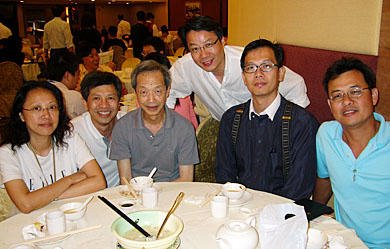絕世高手
周星馳在他的電影裡面,常愛將一些絕世高手描寫成其貌不揚、深藏不露、甚至是極其市井和醜陋,或蹟近顛狂,好像是要衝著世界(特別是香港)「先敬羅衣後敬人」的價值觀,說明身懷絕技也不一定要急不及待告訴全世界,比起大美國荷里活拍出來的X-Men、The Incredibles或Fantastic Four,提倡「假若你擁有一身絕世好武功,就必定是天將要降大任於斯人,應該將它盡情發揮」,來得含蓄得多。

這幀照片裡面左起第三位長者,我和一班舊同事都稱他「黃師傅」,據說曾任職多家4A廣告公司,現在已經移民加國。黃師傅就是我上面說這種含蓄的高人。他隨了手作正稿和插圖技術了得之外,各種書體的中英文書法手到拿來,中文美術字和做dummy的技術更是我從來沒有見過那樣好,是「手稿年代」真真正正的師傅級人馬。我雖然用電腦作美術設計超過十五年,還是覺得黃師傅手造的東西更「正」、更「見得人」!黃師傅,我祝你身體健康,請你保重啊!因你見證著科技無發取代的知識、技巧和智慧!謝謝你提醒我:還是上帝的創造奇妙!
今天難得與黃師傅和一班舊同事吃午飯,再見眾人都安好,繼續發揮著港人在獅子山下不屈不撓的精神,深感安慰!
Who am I? Who are you?
We are attached to things or people around us, which and who are what define
who we are. We're afraid that we forget who we are so we keep on grasping things or people around us. Think about how you introduce yourself to people:
"I am Patrick." Some people define themselves with their
names, because their names reveals certain stories (and thus meanings) in their lives. Those are either joyful stories they treasure or painful memories they couldn't get rid of. It further strengthen their life narratives. So why do people change their names?
"I am a man." or "I am a woman." Some people define themselves according to their
sex, (note that in some forms that we need to fill in, people begin to use gender (性向) instead of sex (性別) -- you know why.) because man and woman "are supposed to" act and behave differently. Do you agree?
"I am a man. I'm not a kid anymore!" Some people define themselves according to their
age, because every age group "is supposed to" do different things, and belonging to certain age group entitles or limit you from doing certain things. And in our community there are certain age groups which got bigger control over the others. Guess which?
"I am a designer.", "I am an artist." or "I am a writer." We define ourselves according to our
profession, because either the profession reflects certain social class we belong, or reflects our accomplishment or how much we earn. If we are not, we'll try to cover it with some terms which sounds better, or we wouldn't introduce ourselves in this way, and use something else to define ourselves. True?
"I am a Macintosh enthusiast.", "I am a celloist.", "I am a tough negotiator." or "I am Miss Hong Kong." We define ourselves according to
things which we're good at, because it reflects our taste and it gives us some sense of significance of ourselves. The more we get the significance, the harder we'll study or practice into it. It is something to claim victory over someone who is actually more powerful than us ("My boss is a dumb, he just uses Wintel PC." or "These kids only know Twins and Kenny. They'll never be interested in Bach or Tchaikovsky."). How about you?
"I am a Chinese." or "I am a Hongkonger." We define ourselves according to our
ethnical standing. We identify ourselves to a certain group of people whom we don't actually know (most of them we don't even know their names or never met them before! (Anderson, 1983)) but feel very connected because we buy in the same culture as theirs, or we found our so-called root among them. What does it mean to you by being a Chinese or a Hongkonger?
"I am the husband of Patricia.", "I am the son of Mr Chan.", "I am a student of Paul Rand." or "I am a loyal fan of Twins." We define ourselves according to
our relation with other people, most probably because these people means a lot to us. They may be someone we're proud of. Who are you attached to? What if these people disappoint you one day?
"I am a father of 2 kids." We define ourselves according to
our role in the family, most probably because we enjoy very much our family life. But on the dark side, this role gives us pride too -- we tend to introduce ourselves like this when we are enjoying the dominant role and we have authority over other family members. If other members in the family turn hostile or rebellious against us, we'll try to hide our family conditions before other people. Does your family members make you proud?
"I am an environmentalist." or "I am an anti-terrorist." We define ourselves according to
our discontent about our surroundings. So badly we hope that we can contribute something to make our surroundings nearer to what we want it to be. What is your discontent?
"I am a Christian." We define ourselves according to
our belief, our faith or religion. It represents something we're heading for and striving to be. This is our ideal self, although we're not up to the standard yet. Are you ready to go totally committed to it?
Anderson, Benedict (1983). Imagined Communities: Reflections on the Origin and Spread of Nationalism. London and New York: Verso.
 這幀照片裡面左起第三位長者,我和一班舊同事都稱他「黃師傅」,據說曾任職多家4A廣告公司,現在已經移民加國。黃師傅就是我上面說這種含蓄的高人。他隨了手作正稿和插圖技術了得之外,各種書體的中英文書法手到拿來,中文美術字和做dummy的技術更是我從來沒有見過那樣好,是「手稿年代」真真正正的師傅級人馬。我雖然用電腦作美術設計超過十五年,還是覺得黃師傅手造的東西更「正」、更「見得人」!黃師傅,我祝你身體健康,請你保重啊!因你見證著科技無發取代的知識、技巧和智慧!謝謝你提醒我:還是上帝的創造奇妙!
這幀照片裡面左起第三位長者,我和一班舊同事都稱他「黃師傅」,據說曾任職多家4A廣告公司,現在已經移民加國。黃師傅就是我上面說這種含蓄的高人。他隨了手作正稿和插圖技術了得之外,各種書體的中英文書法手到拿來,中文美術字和做dummy的技術更是我從來沒有見過那樣好,是「手稿年代」真真正正的師傅級人馬。我雖然用電腦作美術設計超過十五年,還是覺得黃師傅手造的東西更「正」、更「見得人」!黃師傅,我祝你身體健康,請你保重啊!因你見證著科技無發取代的知識、技巧和智慧!謝謝你提醒我:還是上帝的創造奇妙!